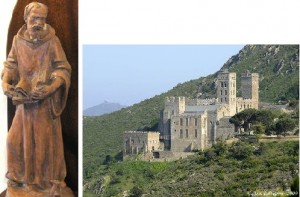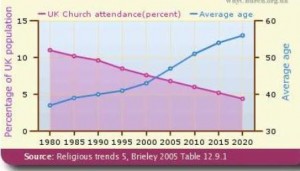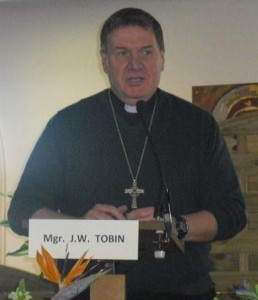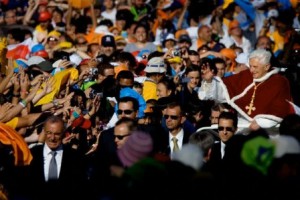God never has, never could and never will, leave his people without his presence and his support. Both in Biblical times, and in the history of the Church, since Jesus lived and died and rose again, God has found ways to manifest his presence, and support his people. In the Old Testament, this might mean ‘punishing His beloved people’, as the Word of God proclaims:
My child, do not regard lightly the discipline of the Lord,
or lose heart when you are punished by Him;
for the Lord disciplines those whom he loves,
and chastises every child whom he accepts. (Heb 12 5-6)
 |
1) Map showing the Exodus 2) Jews taken to Babylon
The exile to Babylon, in the time of King Zedekiah, (597 BC), is a particular example, because the leaders of Judah, the priests and people, were very unfaithful to God; they copied the shameful practices of those who did not know God, defiled their temple, and when God sent them prophet after prophet, they ridiculed God’s messengers and laughed at them. God’s anger became so fierce that there was no other remedy except exile, and the scholars think about 50,000 Jews were taken there, (2 Chronicles 36: 14-21). It makes one think about what might happen in our own times.
God does not only help and support by punishing. He also gives us practical help, and this is illustrated by events in Church History. Let us take, as an example, St. Benedict (480-547 AD), and his monastic movement in the 5th and 6th centuries in Europe.
 |
1) St. Benedict’s statue in the entrance to St. Mary’s Priory Leyland …… 2) An Ancient Monastery
At that time, Europe suffered a major breakdown in its civilisation, because the rampaging tribes from the East had invaded this rich and fertile Empire of Rome. From the early 4th Century, Christianity had been the official religion of the Empire, (Emperor Constantine 313 AD), but in the following 200 years, a kind of melt-down of normal life happened.
St. Augustine of Hippo, (died 330 AD), wrote a book called “The City of God”, in which he laments the fall of the Empire, with the invasions already happening, and he sees it as a great disaster, because so many saw the structures of the State and of the Church so closely linked, that the destruction of the State, might also mean the destruction of the Church. However, St. Augustine was a great man of God, and he saw beyond to God’s providence and love for his people, despite the tragedy that was happening.
The monasteries, for the next few hundred years, were centres of peace and learning, in a ‘desert’ without civilisation: it is true that some were attacked and destroyed by invaders, but the ideal, and the life, lived through it all, and contributed to the restoration of stability, peace and a new civilisation once again.
Benedict followed God and the Word of God; his rule is totally immersed in the Scriptures, and Benedict would say: “… that we must labour to return to God, by listening to God and his Word under obedience to God, whom we have lost by the sloth of disobedience, (Prologue of the Rule, start). “I have come down from heaven not to do my will but to do the will of him who sent me”, (John 6: 38), and Jesus can say: “I and the Father are one”, (John 10; 30). To be one with God, and in Him, with our neighbours, is one fruit of living the charism of Benedict, and to find the meaning and purpose of our mysterious lives.
St. Benedict was the first Saint to be named a Patron of Europe, and through him, God worked to build up what had been destroyed. He gives an example of what happens throughout history; similarly, we may expect such divine providence in today’s world, in which the values of Christian living are under threat, in the different circumstances of today.
The graph below shows the decline in all UK Church attendance, that even in 1980, started from a low percentage of say 12%.
 |
The question at the start of this reflection is, “Will the Church survive?” Faith tells us that it will, but it may not happen in some places. The very first place, where followers of the ‘Way of Jesus’ were called ‘Christians’, was at Antioch, and this great Church has been totally destroyed, in the course of time. So has much of the Church of North Africa, and such destruction could happen in our own country. Three further pieces of evidence have come my way, in the past weeks, sufficient to make me realise the depths of the challenge the Church faces.
The most significant is from Archbishop Joseph Tobin (C.S.S.R.), who is the current secretary of the Congregation for Institutes of Consecrated Life and Societies of Apostolic Life of the Vatican. In a recent address to the Union of the European Conferences of May Superiors, he refers to the forthcoming Synod of Bishops, to be held in Rome, on the New Evangelization. In it he points out that those preparing for this Synod, in their document, ‘Lineamenta’ explain about the ‘educational emergency’ the Church is facing. He goes on to state:
 |
Mgr. J W. Tobin
The “educational emergency” means that the Church is no longer able to transmit to young people all that she owes them. This failure, even impotency, is more tormenting, if one believes that an essential element of the mission of Jesus and, as a necessary consequence, the mission of the Church is to “proclaim liberty to captives and recovery of sight to the blind … to let the oppressed go free” (cf. Lk 4, 18). Is it possible that the true freedom of young people is actually distorted because of the inability of the Church to transmit to them what they need to live?
I would certainly identify with this ‘impotency’ of the Church to transmit to young people, and would add that it is just as difficult for many parents and grand-parents trying to communicaate with them.
Then, there is evidence from the new Confirmation Programme we have just completed. Bishop Tom Williams saw the joy, and even enthusiasm, on the faces of the candidates; he commented on the presence of strong families around them, and asked me if there had been a significant increase in numbers at Mass as a result. I had to answer there was no significant change in Mass numbers! Worshipping regularly, in Church, is not on the ‘radar’ of an increasing number of Catholics – at least in Leyland. However, this does not mean that people do not believe in God.
Finally, a member of the South Ribble Borough Council was sharing with a group of us about funding, and other issues. He was able to state, clearly, that funders who would support development projects, in Church buildings, would only do so, if they saw a need that was sustainable over the next 20 years. If, in a Church, it was seen that there would be only a small group of 50 or so worshippers, regularly coming to Church in 20 years’ time, and nobody else, in any other capacity from the community, they would not be prepared to give money, to develop the building. Witnessing the decline in Church numbers, funders in Lancashire, at least, are not prepared to support Church building developments, for the congregation alone. The ordinary business man is pretty clear what is going to happen.
Observing those who are active in the parishes, it is a fact that many of these faithful are those who have been touched by something extra, to feed their spiritual lives, than just the structure of diocese and parish. We all need that something extra. The hierarchical aspect of Church life, with its ritual, its commissions, its organization, its ideas, is not enough, in the present age, to feed the people spiritually. This observation is supported by important teaching in the Church, namely from Pope John Paul II, 1983, to the Latin American Episcopal Council (CELAM).
“The spiritual needs of many Catholic lay people are not being met through the traditional institutions of the Church. These spiritual needs, coupled with the challenges facing Christians in a secularized world, have led to the formation of the communities (i.e. new movements in the Church). Their spiritual hunger and their fulfilment through the gifts of the Holy Spirit have brought unexpected blessings to the Church and to society. The groups have been in the vanguard of the “new evangelization”. They are experienced as “new in ardour, methods and expression”
Cardinal Ratzinger, before he became Pope in 1998, reflected that “the charismatic and institutional aspects are quasi coessential to the constitution of the Church.” The charismatic side of the Church includes all the Religious Orders, and now, increasingly recognised, are many new ecclesial movements in the Church. It is the latter, that are the more important for the future of the Church today, as it is not true of the Religious Orders, that they have new life-styles, new in ardour, methods and expression. In a way, they may often have become ‘fossilized’ with their own institution, ritual and style; certainly, there are few vocations.
The new, Spirit-led Movements are really gifts of God, for our time, and, as this reflection began, God never deserts his people. He seems to have organized, especially, the laity – without excluding clergy – to be open and ready to be a part of these different ‘Movements’. At Pentecost 1998, Pope John Paul II issued an invitation for members of new movements to come to a gathering in St. Peter’s Square in Rome; in fact five hundred thousand Catholics came and participated in the event. This was followed by Pope Benedict, in 2006, with many of the members of different ecclesiastical movements.
One aspect of these New Movements – like the Religious Orders – is that they all take the Word of God seriously. Just like the Religious Orders, they form people into community; this is what God’s Word does!
When we return to the original question: “Will the Church survive?” we can say through faith “Yes, of course”, but not in any particular place. For the sake of the future, for our children and grandchildren, let us pray that the Church, and its values, will survive, even in our own country. The key will be that, those who are already a living part, of the Body of the Church, will persevere and remain faithful. All those people will require help to do so, from God, and from his chosen instruments – people who bring God’s presence into life – people who are firmly believers, and who, joyfully and humbly, put their beliefs into practice – people who do not flinch from that path.
In conclusion, Pope Benedict, at the vigil of the Feast of Pentecost, June 3rd 2006, said:
 |
His Holiness the Pope – St. Peter’s Square – the Vigil of Pentecost 2006
You have come to St Peter’s Square this evening in really large numbers to take part in the Pentecost Vigil. I warmly thank you. You belong to different peoples and cultures and represent here all the members of the Ecclesial Movements and New Communities, spiritually gathered round the Successor of Peter to proclaim the joy of believing in Jesus Christ and to renew the commitment to be faithful disciples in our time. ….
A similar meeting that took place in this same Square on 30 May 1998 with beloved Pope John Paul II springs to mind. A great evangelizer of our time, he accompanied and guided you throughout his Pontificate.
He described your Associations and Communities on many occasions as “providential”, especially because the Sanctifying Spirit makes use of them to reawaken faith in so many Christian hearts and to reveal to them the vocation they have received with Baptism. He also helps them to be witnesses of hope filled with that fire of love which is bestowed upon us precisely by the Holy Spirit.
To view and read the blog, without disrupted formatting, subscribers are advised to go to the main blog site
